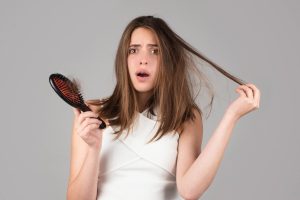Does Working Out Cause Hair Loss? One of the finest strategies for maintaining overall health is exercise. It elevates your mood, aids in weight loss, and may strengthen your heart. But there’s one persistent query that fitness enthusiasts frequently have: Does exercising result in hair loss? In this blog post, we’ll debunk myths, explain the connection between exercise and healthy hair, and provide advice on how to stay in shape and have gorgeous hair.
Comprehending Hair Loss
Millions of people worldwide suffer from hair loss, a prevalent worry for both men and women. Even though regular hair loss is average, excessive or unexpected hair loss can be upsetting and indicate more severe problems. To manage hair loss successfully, it’s critical to comprehend the many forms of hair loss, their causes, and available therapies.
Different Types of Hair Loss
There are various forms of hair loss, and each has distinct traits and causes:
- Alopecia Androgenetic (Blank Pattern)
The most prevalent hair loss is androgenetic alopecia, often known as male or female pattern baldness. Hormonal fluctuations and genetics are the leading causes of it. Women usually experience diffuse thinning across the scalp, whereas men usually experience a receding hairline and thinning at the crown.
- The Effluvium Telogen
The increased shedding results from many hair follicles being forced into the telogen phase, the resting phase of the hair cycle, due to stress or shock to the system. Telogen effluvium is frequently a transient condition brought on by diseases, surgery, childbirth, or psychological stress.
- Areata Alopecia
An autoimmune condition called alopecia areata causes sudden, uneven hair loss by attacking hair follicles using the body’s immune system. Alopecia totalis, complete baldness, cia universalis, or diffuse hair loss throughout the entire body are possible outcomes of this disorder.
- Alopecia Traction
This kind of hair loss is brought on by the hair follicles being physically stressed out by constant tugging from tight hairstyles like ponytails, braids, or extensions. If left untreated, the ongoing stress can eventually cause irreversible hair loss.
Typical Reasons for Hair Loss
Several things can cause hair loss, such as:
- Heredity
Genetics is a significant factor in hair loss. If it runs in your family, you are more likely to have hair loss. Genetic factors play a significant role in androgenetic alopecia.
- Modifications in Hormones
Hair thinning or shedding can result from hormonal fluctuations, such as those that occur during pregnancy, menopause, or thyroid diseases. Dihydrotestosterone (DHT), in particular, is connected to patterned baldness and shrinking of hair follicles.
- Inadequate Nutritional Support
Hair loss may result from a deficiency of vital nutrients, such as zinc, iron, vitamin D, and biotin. Sustaining a nutrient-dense, well-balanced diet is essential for fostering healthy hair.
- Health Issues
Hair loss can be brought on by several illnesses, including thyroid issues, autoimmune diseases, and polycystic ovarian syndrome (PCOS). In addition, transient hair loss is a common side effect of treatments like radiation therapy and chemotherapy.
- Drugs
Hair loss is a side effect of some medications used to treat disorders like depression, cancer, and high blood pressure. Usually, this type of hair loss can be reversed if the medicine is stopped or changed.
- Tension
Stress, both mental and physical, can exacerbate problems like telogen effluvium and cause hair loss. Persistent stress can worsen shedding and interfere with hair development cycles.
Hair Loss Treatments and Solutions
Many approaches exist to manage and treat hair loss, depending on the reason and extent of the loss. Here are a few typical fixes:
- Topical Interventions
Treatments available over-the-counter, such as minoxidil (Rogaine), can slow down the pace of hair loss and promote hair growth. Androgenetic alopecia responds exceptionally well to these treatments.
- Prescription Drugs
Prescription drugs like finasteride (Propecia) for men can help block the effects of DHT and stop additional hair loss in cases of hormonal abnormalities.
- Surgery for Hair Transplantation
During hair transplant surgery, hair follicles from one area of the scalp (usually the back) are moved to sections of the scalp that are balding or thinning. This surgical alternative is typically considered when all other options have been exhausted.
- Treatment with Platelet-Rich Plasma (PRP)
A tiny amount of your blood is drawn for PRP therapy, processed to concentrate the platelets, and then the platelet-rich plasma is injected into your scalp. This technique is believed to encourage hair growth by stimulating hair follicles.
- Modifications to Lifestyle
Enhancing your general well-being can benefit the condition of your hair. Healthy hair development can be promoted by practicing stress management strategies like yoga or meditation, obtaining enough sleep, and engaging in regular exercise.
- Supplements with nutrition
If nutritional inadequacies are causing hair loss, taking supplements like biotin, iron, zinc, and vitamin D will help promote healthy hair growth again. A doctor should always be consulted before beginning any supplement regimen.
Is Hair Loss a Direct Cause of Exercise?
The short answer is that there is no direct link between exercise and hair loss. Moderate exercise improves blood flow to the scalp, which may promote healthier hair development. Nonetheless, some elements of rigorous workout regimens may unintentionally cause hair loss.
- Severe Physical Stress
Your body may experience stress from high-intensity workouts, particularly if combined with minimal recuperation time. This can eventually result in a condition known as telogen effluvium, a type of transient hair loss caused by stressing out the hair follicles, either physically or emotionally. The hair that would grow out does not grow. This kind of shedding is often transient, and hair growth ought to resume usually when stress levels drop.
- Hormonal imbalances and excessive training
Additionally, overtraining might upset the hormonal balance in your body. Excessive exercise may raise the stress hormone cortisol. Long-term high cortisol levels can cause hair thinning and shedding, especially in people prone to hair loss. Furthermore, overtraining-related hormone imbalances or low testosterone levels can further exacerbate hair loss.
- Hydration and Hair
While excessive perspiration during exercise may not be the direct cause of hair loss, unhygienic scalps can. Salt and sweat buildup on the scalp can clog hair follicles and cause dandruff or scalp infections, which can cause hair loss. Keeping your scalp clean is critical, particularly if you exercise regularly.
- Use of Anabolic Steroids
The use of anabolic steroids to boost muscle growth is associated with hair loss in bodybuilders and rigorous fitness trainers. In people who are susceptible to androgenetic alopecia, these steroids can transform into dihydrotestosterone (DHT), a hormone that is known to decrease hair follicles. These steroids mirror testosterone.
How to Keep Fit While Protecting Your Hair
There are things you can do to reduce the dangers if you’re worried about hair loss while continuing your exercise regimen:
- Maintain a Balance in Your Workout Routine
Give your body enough downtime between workouts to prevent overtraining. Combine high-intensity workouts with low-intensity activities like yoga or walking to maintain equilibrium and lessen physical strain.
- Eat healthfully and stay hydrated
Nutrition and hydration are essential for healthy hair and fitness. Ensure you get adequate vitamins and minerals, especially protein, biotin, zinc, iron, and vitamin D, which promote hair development. A balanced diet of leafy greens, healthy fats, and proteins may help you achieve your fitness objectives and good hair.
- Maintain Good Scalp Hygiene
Wash your hair frequently, particularly following vigorous exercise that makes you sweat a lot. Steer clear of solid chemicals irritating your scalp, and use gentle shampoos and conditioners instead. To get rid of pollutants and improve the quality of your hair, try using scalp hair products if you’re having problems with perspiration buildup.
- Control Your Stress
Both physical and mental stress can cause hair loss, so include stress-relieving exercises such as yoga, deep breathing, or meditation in your regimen. A healthy sleep and recuperation schedule is essential for maintaining fitness and hair health.
- Speak with a Physician
Seeking advice from a healthcare expert is always advised if you observe noticeable hair loss. They can offer advice on suitable therapies and assist in determining whether your hair loss is related to hormones, exercise, or other causes.
Conclusion
Exercise-related factors such as severe physical stress, hormonal imbalances, and poor scalp hygiene can cause hair thinning, even if exercise does not directly cause hair loss. You may continue working out without worrying about your hair if you follow a well-balanced fitness plan, eat healthily, and adequately care for your scalp. And always remember that it’s always a good idea to consult a doctor if you’re experiencing severe hair loss. Ultimately, having a healthy head of hair is generally associated with having a healthy body!
Reclaim Your Confidence With Neograft Hair Restoration Orange County
Are you tired of battling hair loss and dreaming of a hair regrowth, more natural-looking hairline? Our team of skilled surgeons and hair restoration experts at Neograft Hair Restoration Orange County, situated in stunning Orange County, California, is here to discuss hair loss prevention. We provide state-of-the-art, customized hair transplants, promising outstanding results and a seamless journey from consultation to recovery, so you can look forward to a brighter, more confident future. Contact Us for a consultation with Neograft Hair Restoration Orange County to start improving your appearance and self-esteem. Our experts will provide you with all the haircare tips you need. Allow us to assist you in getting the healthy, full head of hair you deserve so that you don’t let hair loss hold you down anymore!
FAQs: Does Working Out Cause Hair Loss?
1. Does exercise directly cause hair loss?
No, moderate exercise does not directly cause hair loss. It can improve blood flow to the scalp, promoting healthy hair growth. However, excessive physical stress from overtraining can contribute to temporary hair loss.
2. Can high-intensity workouts lead to hair loss?
Intense exercise with insufficient recovery time can cause telogen effluvium, a condition where hair follicles enter a resting phase, leading to temporary hair shedding.
3. Does sweating during exercise affect hair health?
While sweating does not cause hair loss, it can lead to scalp buildup if not cleaned properly. This buildup can clog hair follicles, contributing to dandruff or scalp infections, possibly leading to hair shedding.
4. How does stress from exercise contribute to hair loss?
Exercise-related stress can raise cortisol levels, triggering hair shedding in people prone to hair loss. Over time, high cortisol can disrupt hair growth cycles.
5. Can anabolic steroids used for bodybuilding cause hair loss?
Yes, anabolic steroids can convert to dihydrotestosterone (DHT), a hormone linked to androgenetic alopecia. This can lead to hair follicle shrinkage and hair loss in susceptible individuals.
6. How can I prevent hair loss while maintaining my fitness routine?
To prevent hair-related issues, maintain a workout routine with enough rest between sessions, eat a nutrient-rich diet, stay hydrated, and practice good scalp hygiene to prevent hair loss from exercising permanently.
Exercise-related hair loss, like telogen effluvium, is typically temporary. Hair growth should resume once the body recovers from stress or hormonal imbalances.
8. Can hormone imbalances from overtraining cause hair thinning?
Yes, overtraining can disrupt hormone levels, remarkably increasing cortisol, which may lead to hair thinning. This is more likely in individuals already predisposed to hair loss.
9. What nutrients are essential for healthy hair while working out?
Critical nutrients like protein, biotin, zinc, iron, and vitamin D promote hair growth and overall hair health, supporting both fitness goals and hair vitality.
10. Should I consult a doctor if I notice hair loss after working out?
Yes, if you experience significant or persistent hair loss, it’s advisable to consult a healthcare professional to determine the underlying cause and explore treatment options.















Recent Comments